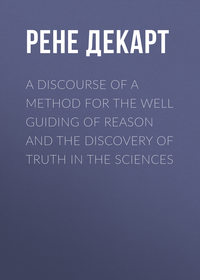A Discourse of a Method for the Well Guiding of Reason and the Discovery of Truth in the Sciences

Полная версия
Добавить В библиотекуАвторизуйтесь, чтобы добавить
Добавить отзывДобавить цитату
A Discourse of a Method for the Well Guiding of Reason and the Discovery of Truth in the Sciences
Авторизация